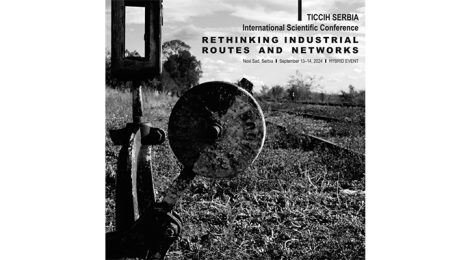
TICCIH SERBIA International Scientific Conference
TICCIH SERBIA International Scientific Conference
RETHINKING INDUSTRIAL ROUTES AND NETWORKS
Novi Sad, Serbia
September 13–14, 2024
HYBRID EVENT
Following the ongoing debates on the European cultural heritage foundation, the first TICCIH Serbia International Conference rethinks the role of industrial heritage in the challenges facing common historical, present, and future cultural values.
In the current year, we are marking the 70th anniversary of the European Cultural Convention, adopted to achieve a greater unity among the members of the European Commission to safeguard and realize the ideals and principles which are their common heritage. During the past decades, Europe has experienced a transformation of the social, political, and cultural milieu, which resulted in a critical review of the concept of common heritage in recent years. In this context, the Conference will examine the dynamics of establishing and breaking links and relations between mutually intertwined histories and cultures.
Since 1985, the signatory states of the European Cultural Convention have been celebrating their common heritage within the European Heritage Days, a participatory cultural program initiated by the Council of Europe and the European Commission. Participatory events, organized every September, bring together experts and the public to explore and enjoy cultural heritage. The first TICCIH Serbia Conference theoretically discusses this year’s theme of the European Heritage Day – Heritage of Routes, Networks and Connections – within heritage studies and cultural tourism.
The conference aims to review various aspects of industrial routes and networks grouped around three thematic sections.
Although industrial history can be considered a crucial segment of the European past, today, memories of that era are fading despite numerous industrial monuments across Europe. The first thematic section highlights the role of merging industrial historical elements, tangible and intangible, in the context of re-examining mutual memories and cultural values. In particular, it addresses historical routes, such as railways, roads, and canals, recalling their role in creating the European collective identity.
The second thematic section reviews the significance of various industrial heritage routes in the context of tourism. Contributions presenting the experience of sites that are part of the European Route of Industrial Heritage (ERIH), European Cultural Routes, and others are welcome. The focus will be on the role of industrial routes in sustainable tourism and local community development.
The third thematic part is dedicated to considering the role of digital technologies in transforming existing and developing new industrial directions. We are rethinking the role of digitization in increasing interactivity and participation. During the COVID-19 pandemic, demand for virtual access to heritage sites has reached unprecedented levels. New digital networks and virtual routes were formed. We welcome positive and negative examples and discussion on the topic. More details can be found onMore details can be found on the website.bsite.

